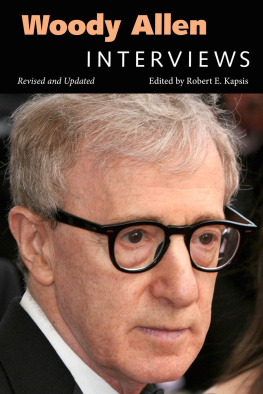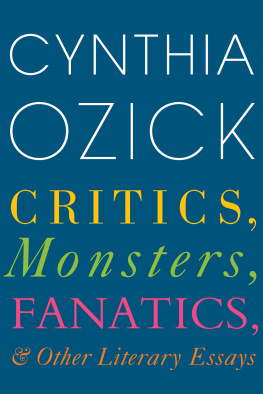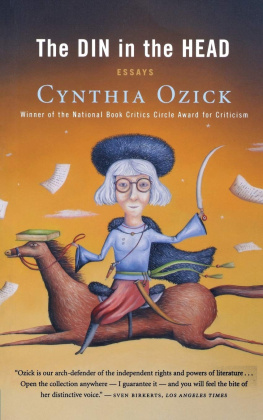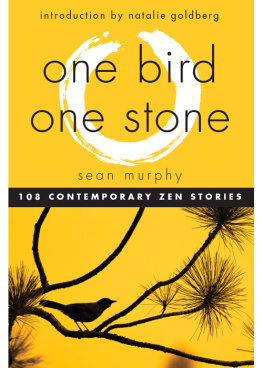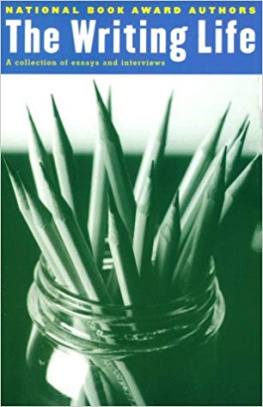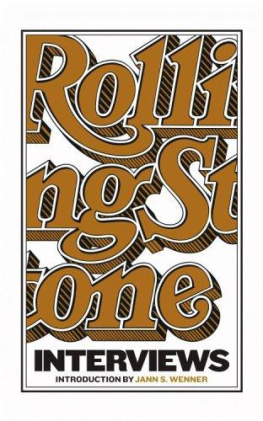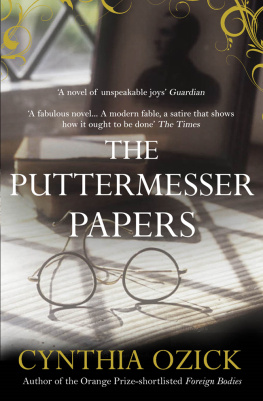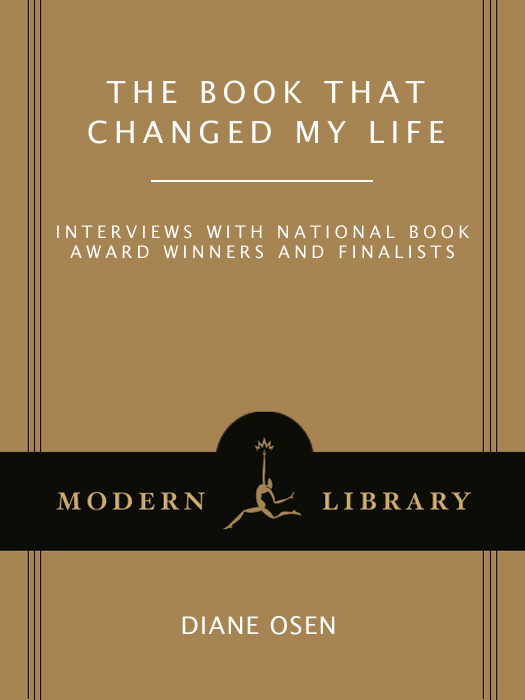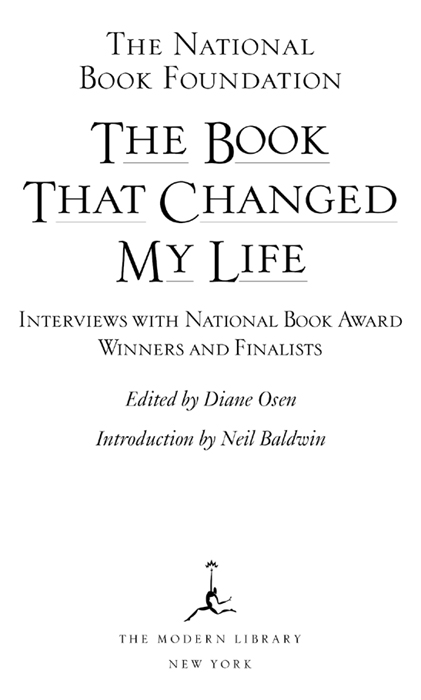2002 Modern Library Paperback Edition
Copyright 2002 by the National Book Foundation
Introduction copyright 2002 by Neil Baldwin
All rights reserved under International and Pan-American Copyright Conventions. Published in the United States by Modern Library, a division of Random House, Inc., New York, and simultaneously in Canada by Random House of Canada Limited, Toronto.
M ODERN L IBRARY and the T ORCHBEARER Design are registered trademarks of Random House, Inc.
LIBRARY OF CONGRESS CATALOGING-IN-PUBLICATION DATA
The book that changed my life: interviews with National Book Award winners and finalists/edited by Diane Osen; introduction by Neil Baldwin.2002
Modern Library pbk. ed.
P. cm.
eISBN: 978-0-307-79365-2
1. Authors, American20th centuryBooks and reading. 2. Authors, American20th centuryInterviews. 3. Authorship. I. Osen, Diane, 1956
Z1039.A87 B66 2002
810.90054dc21 2002141583
Modern Library website address: www.modernlibrary.com
v3.1
To my Beloved Parents
A CKNOWLEDGMENTS
I owe a great deal to a great many. First and foremost, I wish to thank Neil Baldwin, executive director of the National Book Foundation, for his illuminating introduction to this book, for his enthusiastic support of the project, and for his enduring friendship. I am profoundly grateful as well to Meredith Andrews, Maryann Jacob, and Sherrie Youngthe program officers of the National Book Foundationfor five years of expert advice and cheerful assistance; and to Meg Kearney, associate director of the Foundation, for many insightful suggestions.
I am indebted, too, to the remarkable writers who donated so much time and effort to this project; they and their books have changed my life beyond measure. Thank you all: James Carroll, Don DeLillo, E. L. Doctorow, Charles Johnson, Diane Johnson, Philip Levine, David Levering Lewis, Barry Lopez, David McCullough, Alice McDermott, Cynthia Ozick, Grace Paley, Linda Pastan, Katherine Paterson, and Robert Stone.
Many thanks as well to Peter Olson, chairman of Random House, for not only acquiring The Book That Changed My Life, but for overseeing the generous donation of all profits from the book to the National Book Foundation; to Ann Godoff, publisher of Random House, for ensuring that the book found just the right home within the house; and to David Ebershoff, publishing director of the Modern Library, for laboring so skillfully and lovingly over the manuscript.
Finally, I thank my husband, Rick, and my daughter Serena, with all my heart.
C ONTENTS
I NTRODUCTION
Neil Baldwin
Do not all the achievements of a poets predecessors and contemporaries rightly belong to him? Why should he shrink from picking flowers where he finds them? Only by making the riches of the others our own do we bring anything great into being.
J OHANN W OLFGANG VON G OETHE
I want to point to the elected presences which makers construe within themselves or within their works, to the fellow-travellers, teachers, critics, dialectical partners, to those other voices within their own which can give even the most complexly solitary and innovative of creative acts a shared, collective fabric.
G EORGE S TEINER , Grammars of Creation
Allow me to introduce the person who invented the provocative, multifaceted conceit for The Book That Changed My Life, the book you hold in your hands, the book that may very well change your life, as it has mine.
I have known and worked closely with Diane Osen, the editor of this volume, since a mild, late-spring day in 1989, when she came to my office at the New York Public Library to congratulate me for taking on the daunting challenge of executive director of the brand-new National Book Foundation. As public-relations counsel to the fledgling organization, she had been sent as a welcoming emissary on behalf of a group of board members led by Chairman Al Silverman. I was instantly charmed by this bright-eyed, dark-haired, smiling, well-spoken, professionally put-together, and unflaggingly upbeat young woman who had read all of Trollope. We went on to brainstorm and work together on a succession of literary and educational projects over the ensuing decade and moresophisticated, image-building PR, Dianes earlier forte, was merely the beginning of our collaborationand I came to appreciate and respect her passion for books and reading.
I would prefer obsession (in the good sense) to passion, because this is the second compendium of National Book Award essays and interviews published bearing Dianes byline. The first compilation, likewise brought out as a philanthropic gesture by Random House, was The Writing Life in 1995. Reflecting upon the dozens of long conversations and reams of correspondence she has conducted with contemporary authors, Diane told me recently that she is trying to share with the reader the same thrill of immediacy she experiences, the awareness of how privileged and fortunate she is to be in a position to chat so openly with such a broad spectrum of admired writers.
Her methodology is rigorous. She prepares by reading everything she can about and by the author. Then, in keeping with the unique theme of the current volume, she becomes familiar with the literary works, as she expresses it, that have shaped the subjects writing life, in many cases since childhood. She prepares a roster of carefully worded questions before picking up the telephone at the appointed time for the conversation, and she always advises her subject that she does indeed have questions at hand. Once the interview tape gets rolling, more often than not Diane intuitively modifies her direction when moods shift and attentions diverge, but as you will soon pleasurably discover, freshness and spontaneity are preserved.
What is the overarching message she is trying to convey, the largest lesson she has learned? I asked the intrepid editor. Without hesitating, as if the answer were engraved on her psyche, Diane replied, Stories are essential to our very nature as human beings.
Even before Diane came up with the informing concept for this book, I had been turning over and over in my own mind the mutating meanings of influence, a tricky word when applied to the process of making literature. Unlike small tributaries flowing reliably, by natural force of gravity, into the larger river, influences are often not discernible to the person who is asked to identify and then attribute significance to them, within himself or in others. Can an influence have an effect upon us if we have forgotten it? How do we quantify its power? If a literary critic points to an influence upon a writers work, does it matter if the writeror readeraccepts the theory or not?
This intrusive dilemma ambushed me while I was watching Kate Burton present an incendiary Hedda Gabler, managing to take over every corner of the stage simultaneously, infecting all the other charactershusband, ex-lover, friendwith her desperate passions. A chain of intellectual free associations that are the curse of the overeducated pushed their way to the surface of my brain while I struggled to keep my appreciation focused upon the performance itself: Ibsen naturalism James Joyce some essay or review he wrote about the playwright oh yes, then there was Joyces own play, The Dead but it wasnt just about a style of stage drama with Joyce, it was also the modern psychological drama at work in the unconscious you mean Stephen Dedaluss journey to maturity? (I asked myself, inventorying my dusty undergraduate reading list) no, more appropriately, Leopold Blooms thoughts the counterpoint of his perambulating inner drama played out against what was actually happening on June 16, 1904 yes, but remember,


